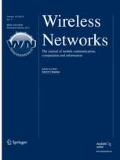Abstract
In recent years, a variety of mobile computers equipped with wireless communication devices have become popular. These computers use applications and protocols, originally developed for wired desktop hosts, to communicate over wireless channels. Unlike wired networks, packets transmitted on wireless channels are often subject to burst errors which cause back to back packet losses. In this paper we study the effect of burst packet errors and error recovery mechanisms employed in wireless MAC protocols on the performance of transport protocols such as TCP. Most wireless LAN link layer protocols recover from packet losses by retransmitting lost segments. When the wireless channel is in a burst error state, most retransmission attempts fail, thereby causing poor utilization of the wireless channel. Furthermore, in the event of multiple sessions sharing a wireless link, FIFO packet scheduling can cause the HOL blocking effect, resulting in unfair sharing of the bandwidth. This observation leads to a new class of packet dispatching methods which explicitly take wireless channel characteristics into consideration in making packet dispatching decisions. We compare a variety of channel state dependent packet (CSDP) scheduling methods with a view towards enhancing the performance of transport layer sessions. Our results indicate that by employing a CSDP scheduler at the wireless LAN device driver level, significant improvement in channel utilization can be achieved in typical wireless LAN configurations.
Similar content being viewed by others
References
E. Amir, H. Balakrishnan, S. Seshan and R. Katz, Efficient TCP over networks with wireless links, in: The First International ACM Conference on Mobile Computing and Networking 1995, Berkeley, CA (December 1995).
A. Bakre and B. R. Badrinath, I-TCP: indirect TCP for mobile hosts, in: Proceedings of the International Conference on Distributed Computing Systems, Vancouver, Canada (IEEE Press, 1995).
R. Caceres and L. Lftode, The effects of mobility on reliable transport protocols, in: Proceedings of the International Conference on Distributed Computing Systems, Poznan, Poland (IEEE Press, June 1994) pp. 12–20.
A. DeSimone, M. C. Chuah and O.-C. Yue, Throughput performance of transport-layer protocols over wireless lans, in: Proceedings of the Conference on Global Communications (GLOBECOM) (IEEE Press, 1993) pp. 542–549.
W. Diepstraten, IEEE 802.11: Wireless access method and physical specification, Document IEEE P802.11-93/70 (May 1993).
D. Duchamp and N. Reynolds, Measured performance of a wireless lan, in: 17th Conference on Local Computer Networks, Minneapolis, MN (IEEE Press, September 1992) pp. 494–499.
A. Heybey, NETSIM: The Network Simulator, Laboratory of Computer Science, Massachusetts Institute of Technology (September 1990).
V. Jacobson, Congestion avoidance and control, ACM Comput. Comm. Rev. 18 (August 1988) 314–329. Also: Proceedings of the Sigcomm '88 Symposium, Stanford, CA (August 1988).
W. Jakes, Microwave Mobile Communications (IEEE Press, Piscataway, NJ, 1994). Reissue of 1974 edition.
P. Karn and C. Partridge, Improving round trip time estimates in reliable transport protocols, ACM Trans. Comput. Systems 9 (November 1991) 364–373.
T. V. Laksman and U. Madhow, Performance analysis of windowbased flow control using TCP/IP: the effect of high bandwidth-delay products and random loss, in: Performance 94 (1994).
P. Manzoni, D. Ghoshal and G. Serazzi, Impact of mobility on TCP/IP: an integrated performance study, IEEE J. Selected Areas in Communications 13(5) (1995) 858–867.
S. McCanne and V. Jacobson, The BSD packet filter: a new architecture for user-level packet capture, in: 1993 Winter Usenix Conference, Usenix (January 1993).
S. Shenker, L. Zhang and D. Clark, Some observations on the dynamics of a congestion control algorithm, ACM Comput. Comm. Rev. (October 1990) 30–39.
F. Swarts and H. Ferreira, Markov characterization of digital fading mobile VHF channels, IEEE Trans. Vehic. Tech. (November 1994) 977–985.
L. Tassiulas and A. Ephremides, Dynamic server allocation to parallel queues with randomly varying connectivity, IEEE Trans. Inform. Theory 39 (March 1993) 466.
Dan Walsh et. al., The overview of the sun network file system, in: Proceedings of Winter USENIX, Dallas, TX (January 1985) pp. 117–124.
H. Wang and N. Moayeri, Finite state markov channel – a useful model for radio communication channels, IEEE Trans. Vehic. Tech. (February 1995) 163–171.
R. Yavatkar and N. Bhagwat, Improving end-to-end performance of TCP over mobile internetworks, in: Workshop on Mobile Computing Systems and Applications, Santa Cruz, CA (IEEE Press, December 1994) pp. 146–152.
Rights and permissions
About this article
Cite this article
Bhagwat, P., Bhattacharya, P., Krishna, A. et al. Using channel state dependent packet scheduling to improve TCPthroughput over wireless LANs. Wireless Networks 3, 91–102 (1997). https://doi.org/10.1023/A:1019132612232
Issue Date:
DOI: https://doi.org/10.1023/A:1019132612232




